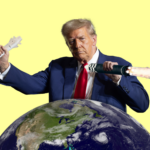Fostering environmental policy convergence
By Christoph Knill, Katharina Holzinger | February 5, 2009
Foreign leaders struggling to make their nation’s environmental protection laws stricter and fearful that increased globalization might work against such aims should pay attention to the results of a recent environmental policy study conducted by five European universities. Dubbed the “Envipolcon Project,” the study identified that environmental laws in Europe, Japan, Mexico, and the United States had converged toward stricter and more similar regulation in the last 30 years.
Simply put, instead of a race to the bottom due to regulatory competition–the lowering of national environmental standards as a consequence of participation in international competitive markets–the exact opposite has taken place. Environmental regulation has grown stricter over time in countries that have participated in globalization.
The positive effect of globalization on environmental protection is to a considerable extent triggered by countries increasingly communicating with each other and exchanging their perceptions and regulatory solutions with regard to environmental problems. In other words, communication matters, as it facilitates cross-national policy-learning. Governments watch each other closely, either because they want to avoid the impression of falling behind the others or to draw lessons from successful policies developed elsewhere. For instance, the Dutch National Environmental Policy Plan was considered a highly successful policy and inspired similar policy developments in many other countries and at the European Union (EU). At the heart of the plan was an encompassing approach to the regulation of environmental problems that explicitly takes into account trade-offs across different materials such as air, water, and soil.
In addition, there’s evidence that due to the moral inducement of regional or international rules and trends, environmental leaders in laggard nations can pull their governments to greater enforcement or passage of environmental regulation. The establishment of legally binding international agreements typically means that lower-regulating countries adjust their standards to the higher levels of environmental leaders. In other words, the stricter states are generally able to set the pace in international environmental regulation.
The fact that we observe European harmonization at the top rather than at the bottom is explained by the dynamics that emerge from the process of regulation creation in the EU and between its member states. These dynamics emerge from the interest of national governments in minimizing the costs of adjusting their domestic regulations to EU requirements. Countries with a rather comprehensive and consistent environmental regulatory framework face considerable difficulties adjusting their laws to fit EU-adopted ones if EU policies differ from their domestic arrangements. As a result, these countries have strong incentives to push their own rules at the European level, hoping to have them adopted regionally and limit the amount of regulation tweaking they need to do in their own counties. To do so, member states must win the support of the European Commission, which formally initiates policies at the EU level. The commission, in turn, is generally interested in strengthening and extending supranational policy competencies.
As a consequence, only domestic initiatives that fit with the commission’s objectives have a chance to pass. This specific interaction of national and supranational interests favors the development of innovative and ambitious supranational policies, which drives policy harmonization toward the stricter side of domestic regulation. On the other hand, this has also contributed to the lack of legally binding agreements. Yet, as shown by several case studies within the Envipolcon Project, mere communication and information exchange can induce laggard countries to raise their standards, as they seek to avoid the blame of being perceived as a pollution haven.
In terms of the future of climate protection, it’s vital to look at emerging market leaders such as China, India, and Brazil. Given the size of their economies and their need for industrial development, their efforts to combat global warming will require curtailing their pollution and adopting cleaner environmental standards. As with some Central and Eastern European countries before their accession to the EU, there’s a fair amount of environmental legislation in such countries, but a dearth of effective implementation.
Since we cannot hope that internal environmental movements will gain enough momentum to successfully influence environmental policies in autocratic states or strongly industrializing countries, international institutions might have to play an even greater role, as our study showed the Organisation for Economic Co-operation and Development did in Europe. But unlike the Central and Eastern European countries that had to adopt and implement strict environmental legislation to join the EU, the international community doesn’t possess the power to induce China or India to rise to the level of environmental protection in the West. As a result, we have much less leverage over the large countries that will considerably contribute to the world’s future pollution. With respect to trade in goods and services that affect the environment, the World Trade Organization can play a role in helping to avoid environmental dumping by supporting environmentally friendly regulations that are used in developed countries. But we shouldn’t expect too much from that course.
Therefore, a means of compensating these rapidly developing countries for contributing a clean and sustainable environment to the global public good will have to be found. The so-called “clean development mechanism,” which allows industrialized nations to buy carbon credits in developing nations as a component of meeting their emissions targets, is one such means–although its effects have been marginal. The Envipolcon Project found that environmental policies in fully developed, rich, and industrialized countries haven’t only converged but also moved upward over the last 30 years. To ensure that the remainder of the world also catches up in terms of combating industrial pollution, the international community must support a system where countries are on equal economic footing–and to commonly search for global solutions to the big problems of climate and biodiversity protection.
Together, we make the world safer.
The Bulletin elevates expert voices above the noise. But as an independent nonprofit organization, our operations depend on the support of readers like you. Help us continue to deliver quality journalism that holds leaders accountable. Your support of our work at any level is important. In return, we promise our coverage will be understandable, influential, vigilant, solution-oriented, and fair-minded. Together we can make a difference.
Topics: Opinion















